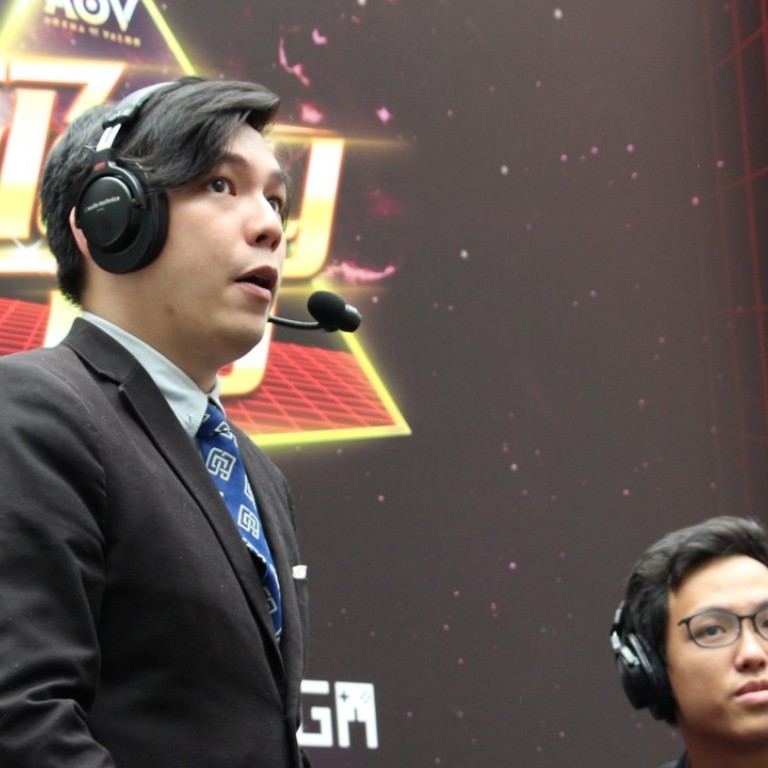
Asian Games: e-sports players no longer geeks, nerds and gaming addicts, says Malaysian commentator Qontra
The Olympic Council of Asia is embracing the age of electronic gaming with a comprehensive programme including Lol, PES and Starcraft in Jakarta
Hours of training every day, holding strategy meetings with teammates, creating synergy between individuals and fine-tuning the skill of making split-second decisions – the life of a professional e-sports player is little different from that of a conventional athlete.
Aaron Chan, a Malaysian e-sports commentator and analyst, said the rise of e-sports as a major global phenomenon in which the top players are treated like stars and earn millions is helping to counter the negativity of “nerds, geeks and gaming addicts”.
In truth, e-sports does not really need acceptance from other sports. It is already a billion-dollar industry with a queue of sponsors eager to be part of the action. And some of the numbers involved – in terms of money, participation and fan support – would have several sports that struggle to fill arenas envious of its success.

The inclusion of e-sports as a demonstration event at the Asian Games in Jakarta is proof that the electronic athletes are gaining wider recognition. It is expected to earn full medal rights at the 2022 Asian Games in Hangzhou, China.
“Not many would understand the challenges faced by some of these individuals in order to earn their title as a professional competitive gamer,” said Chan, who goes by the name of Qontra. “Most parents would be concerned to the point of prohibiting their child from playing any of these games as they were deemed highly addictive, especially in Asia.
“The struggle for an e-sports athlete is just as real as every other athlete. As much as it may seem less physically demanding, it takes a whole lot of mental agility, creativity and mechanical prowess to be good at any competitive titles.

“E-sports athletes clock in hours of training per day. Just like traditional sports, players have to keep themselves in their top form or be surpassed by thousands of other talents who worked harder.
“A proper support system and training facilities were difficult to find back in the days when players had pay out of their own pockets to play or train at cybercafes and similar places.
“Now, e-sports organisations are sponsored by huge brands which enables them to train in gaming houses, hire professional coaches, analysts and physicians.
“E-sports is growing at a rapid speed. Just a decade ago, nobody would have thought that it would be possible to make a living out of playing video games. Back then, gamers who spent many hours were stigmatised and called names like nerds, geeks or gaming addicts.”
At the Dota 2 International 8 tournament in Vancouver last week, Europe’s OG Esports stunned China’s PSG.LGD 3-2 in the final to become US$11 million richer – a first prize that is larger than even the biggest golf and tennis pro tournaments.
The China team is sponsored by European football club Paris Saint Germain.

The total prize pool in Vancouver was US$25,531,984 and much of the money was raised by contributions from the worldwide Dota 2 community who bought Battle Passes that reward players with in-game cosmetics.
Chan started playing League of Legends (LoL) in 2010 after being introduced to the game by a friend. He has competed in a number of tournaments in Malaysia and is a commentator for regional events such as Garena Premier League for Southeast Asia. He also calls and analyses on other titles such as Arena of Valor, PUBG, Fifa 18 and Mobile Legends.
He is excited about the inclusion of e-sports in the Asian Games, which will feature world-class gamers such as South Korea’s Faker (Lee Sang-hyeok) and China’s Uzi (Jian Zihao) in the Lol competition.
In a dream for organisers, South Korea and China will play in the final on Wednesday.
“It is every e-sports athlete’s dream to represent their country in such a prestigious event,” said Chan. “This is a huge leap for e-sports as it could possibly lead up to e-sport titles being in future Olympic Games if the event turns out to be a success.”
Apart from Lol, the titles being contested at the Asian Games are Arena of Valor, Clash Royale, Starcraft 2, Hearthstone and Pro Evolution Soccer 2018.

